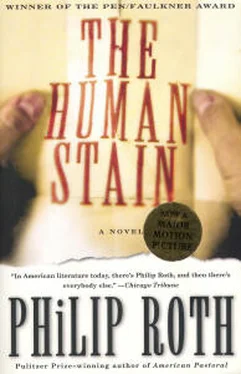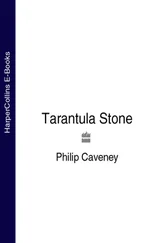No, this was mischief, more than likely, prompted by Delphine's mischief, but more artful, more confident, more professionally demonic by far — a major upgrade of the venom. And what would it now inspire? Where would this public stoning stop? Where would the gullibility stop? How can these people be repeating to one another this story told to Security by Delphine Roux — so transparently phony, so obviously a lie, how can any of them believe this thing? And how can any connection to Coleman be proved? It can't be. But they believe it anyway. Screwy as it is — that he broke in there, that he broke open the files, that he broke into her computer, e-mailed her colleagues — they believe it, they want to believe it, they can't wait to repeat it. A story that makes no sense, that is implausible, and yet nobody — certainly not publicly — raises the simplest questions. Why would the man tear apart her office and call attention to the fact that he'd broken in if he wanted to perpetrate a hoax? Why would he compose that particular ad when ninety percent of the people who saw it couldn't possibly think of it as having anything to do with him? Who, other than Delphine Roux, would read that ad and think of him? To do what she claimed he'd done, he would have had to be crazy. But where is the evidence that he was crazy? Where is the history of crazy behavior? Coleman Silk, who single-handedly turned this college around — that man is crazy? Embittered, angry, isolated, yes — but crazy? People in Athena know perfectly well that this is not the case and yet, as in the spooks incident, they willingly act as if they don't. Simply to make the accusation is to prove it. To hear the allegation is to believe it. No motive for the perpetrator is necessary, no logic or rationale is required. Only a label is required. The label is the motive. The label is the evidence. The label is the logic. Why did Coleman Silk do this? Because he is an x, because he is a y, because he is both. First a racist and now a misogynist. It is too late in the century to call him a Communist, though that is the way it used to be done. A misogynistic act committed by a man who already proved himself capable of a vicious racist comment at the expense of a vulnerable student. That explains everything. That and the craziness.
The Devil of the Little Place — the gossip, the jealousy, the acrimony, the boredom, the lies. No, the provincial poisons do not help. People are bored here, they are envious, their life is as it is and as it will be, and so, without seriously questioning the story, they repeat it — on the phone, in the street, in the cafeteria, in the classroom. They repeat it at home to their husbands and wives. It isn't just that because of the accident there isn't time to prove it's a ridiculous lie — if it weren't for the accident, she wouldn't have been able to tell the lie in the first place. But his death is her good fortune. His death is her salvation. Death intervenes to simplify everything. Every doubt, every misgiving, every uncertainty is swept aside by the greatest belittler of them all, which is death.
Walking alone to my car after Faunia's funeral, I still had no way of knowing who at the college might have had the turn of mind to conjure up the clytemnestra posting — the most diabolical of art forms, the on-line art form, because of its anonymity — nor could I have any idea of what somebody, anybody, might next come up with to disseminate anonymously. All I knew for sure was that the germs of malice were unleashed, and where Coleman's conduct was concerned, there was no absurdity out of which someone wasn't going to try to make indignant sense. An epidemic had broken out in Athena — that's how my thinking went in the immediate aftermath of his death — and what was to contain the epidemic's spreading? It was there. The pathogens were out there. In the ether. In the universal hard drive, everlasting and undeletable, the sign of the viciousness of the human creature.
Everybody was writing Spooks now — everybody, as yet, except me.
I am going to ask you to think [the fac.discuss posting began] about things that are not pleasant to think about. Not just about the violent death of an innocent woman of thirty-four, which is awful enough, but of the circumstances particular to the horror and of the man who, almost artistically, contrived those circumstances to complete his cycle of revenge against Athena College and his former colleagues.
Some of you may know that in the hours before Coleman Silk staged this murder-suicide — for that is what this man enacted on the highway by driving off the road and through the guardrail and into the river that night — he had forcefully broken into a faculty office in Barton Hall, ransacked the papers, and sent out as e-mail a communication written purportedly by a faculty member and designed to jeopardize her position. The harm he did to her and to the college was negligible. But informing that childishly spiteful act of burglary and forgery was the same resolve, the same animus, which later in the evening — having been monstrously intensified — inspired him simultaneously to kill himself while murdering in cold blood a college custodial worker whom he had cynically enticed, some months earlier, to service him sexually.
Imagine, if you will, the plight of this woman, a runaway at the age of fourteen, whose education had ended in the second year of high school and who, for the rest of her brief life, was functionally illiterate. Imagine her contending with the wiles of a retired university professor who, in his sixteen years as the most autocratic of faculty deans, wielded more power at Athena than the president of the college. What chance did she have to resist his superior force? And having yielded to him, having found herself enslaved by a perverse manly strength far exceeding her own, what chance could she possibly have had to fathom the vengeful purposes for which her hard-worked body was to be utilized by him, first in life and then in death?
Of all the ruthless men by whom she was successively tyrannized, of all the violent, reckless, ruthless, insatiable men who had tormented, battered, and broken her, there was none whose purpose could have been so twisted by the enmity of the unforgiving as the man who had a score to settle with Athena College and so took one of the college's own upon whom to wreak his vengeance, and in the most palpable manner he could devise. On her flesh. On her limbs. On her genitals. On her womb. The violating abortion into which she was forced by him earlier this year — and which precipitated her attempt at suicide — is only one of who knows how many assaults perpetrated upon the ravaged terrain of her physical being. We know by now of the awful tableau at the murder scene, of the pornographic posture in which he had arranged for Faunia to meet her death, the better to register, in a single, indelible image, her bondage, her subservience (by extension, the bondage and subservience of the college community) to his enraged contempt. We know — we are beginning to know, as the horrifying facts trickle out from the police investigation — that not all the bruise marks on Faunia's mangled body resulted from damage inflicted in the fatal accident, cataclysmic as that was. There were patches of discoloration discovered by the coroner on her buttocks and thighs that had nothing to do with the impact of the crash, contusions that had been administered, some time before the accident, by very different means: either by a blunt instrument or a human fist.
Why? A word so small, and yet large enough to drive us insane. But then a mind as pathologically sinister as Faunia's murderer's is not easy to probe. At the root of the cravings that drove this man, there is an impenetrable darkness that those who are not violent by nature or vengeful by design — those who have made their peace with the restraints imposed by civilization on what is raw and untrammeled in us all — can never know. The heart of human darkness is inexplicable. But that their car accident was no accident, that I do know, as sure as I know that I am united in grief with all who mourn the death of Athena's Faunia Farley, whose oppression began in the earliest days of her innocence and lasted to the instant of her death. That accident was no accident: it was what Coleman Silk yearned to do with all his might. Why? This “why” I can answer and I will answer. So as to annihilate not only the two of them, but, with them, all trace of his history as her ultimate tormentor. It was to prevent Faunia from exposing him for what he was that Coleman Silk took her with him to the bottom of the river.
Читать дальше












